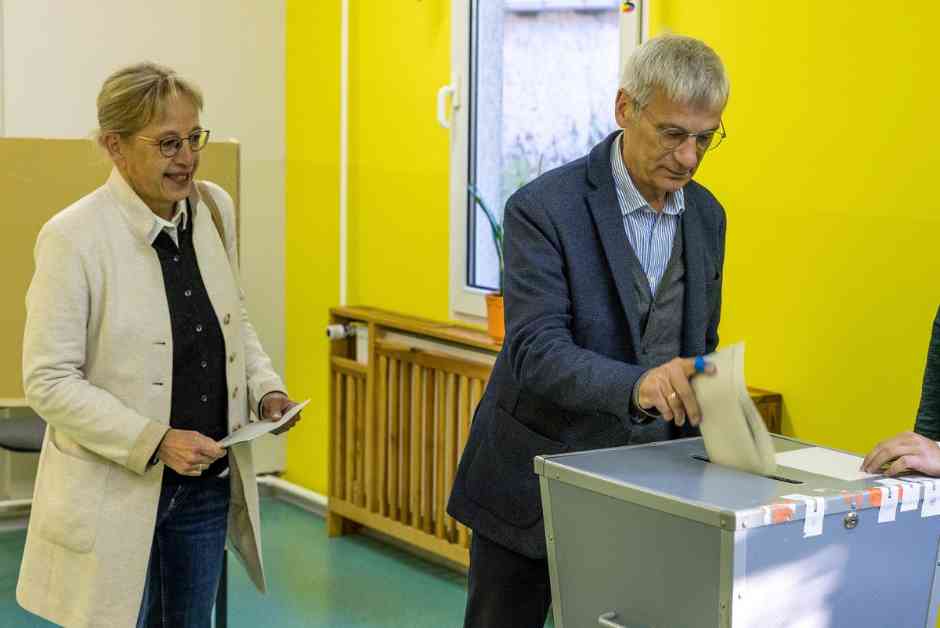Social Democrats in Brandenburg State Election: Battling Against the Far Right
As the state election in Brandenburg approaches, all eyes are on the Social Democrats as they defend their stronghold against the far-right Alternative for Germany (AfD). This election comes on the heels of AfD’s recent gains in other states in eastern Germany, sparking concerns about the country’s political direction. With 2.1 million people registered to vote for a new state parliament in Brandenburg, the outcome of Sunday’s election will have far-reaching implications for Chancellor Olaf Scholz and his coalition government.
The latest polls indicate a tight race between the Social Democrats and the AfD in Brandenburg. The Social Democrats, who have governed the state since German reunification in 1990, are facing a strong challenge from the far-right party. As the largest party in Scholz’s coalition government, the Social Democrats are determined to maintain control of Brandenburg amidst rising support for extreme parties on both ends of the political spectrum.
If the Social Democrats were to lose in Brandenburg, it would not only be a blow to their party but also a bad omen for Chancellor Scholz ahead of the federal election next year. Scholz, who resides in Potsdam, the capital of Brandenburg, is closely watching the outcome of Sunday’s vote as it could shape his political future. The fate of Brandenburg governor Dietmar Woidke also hangs in the balance, with Woidke vowing to resign if the AfD emerges victorious.
The rise of the AfD in recent elections, including in Thuringia and Saxony, has raised concerns about the growing support for the far right in Germany. This trend has been fueled by backlash against large-scale migration, recent extremist attacks, and economic challenges facing the country. The far-right party’s success has underscored the need for mainstream parties to address these issues and regain the trust of voters.
Challenges and Controversies in the Election Campaign
The election campaign in Brandenburg has been marked by heated debates and controversies, with migration, internal security, and peace at the forefront of discussions. Both the far right and the new leftist movement, the Sahra Wagenknecht Alliance (BSW), have advocated for ending weapons deliveries to Ukraine amid Russia’s invasion. These differing views on foreign policy have highlighted the ideological divides within German politics.
The AfD’s strong showing in recent elections has raised concerns about the party’s stance on migration and national security. With Germany facing increasing challenges from extremism and global conflicts, voters are looking to political leaders for solutions and stability. The outcome of the election in Brandenburg will be a test of the electorate’s confidence in the mainstream parties to address these pressing issues.
Despite the AfD’s gains in recent elections, it is unlikely to govern in Brandenburg due to other parties’ refusal to work with them. This has led to speculation about potential coalition formations and the role of smaller parties in shaping the state’s political landscape. As voters head to the polls on Sunday, they will be making a decision that could have far-reaching consequences for the future of Brandenburg and Germany as a whole.
Implications for the Future of German Politics
The outcome of the state election in Brandenburg will have significant implications for the future of German politics. With the rise of the far right and the challenges facing mainstream parties, voters are being forced to confront complex issues and make difficult choices. The election results will shape the political landscape leading up to the federal election next year and could set the tone for the country’s direction in the years to come.
Chancellor Scholz and his coalition government will be closely monitoring the results of the Brandenburg election as they prepare for the challenges ahead. The outcome of Sunday’s vote will not only impact the state’s governance but also send a message about the values and priorities of the German electorate. As the country grapples with internal and external challenges, the election in Brandenburg serves as a microcosm of the broader political landscape in Germany.
In conclusion, the state election in Brandenburg represents a critical moment in German politics, with the Social Democrats facing a tough battle against the far right. The outcome of Sunday’s vote will have far-reaching implications for the country’s political direction and the future of Chancellor Scholz’s government. As voters head to the polls, they will be making a decision that could shape the course of German politics for years to come.












